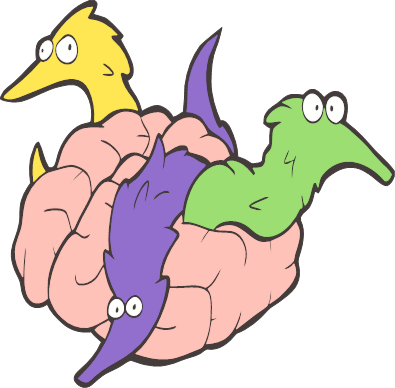Here is the paragraph before it:
The trauma of these years broke the Russian working class. By 1921, Lenin would go so far as to argue that the working class, “owing to the war and to the desperate poverty and ruin, has become declassed, i.e., dislodged from its class groove, and has ceased to exist as a proletariat.” The withering away of the state had reversed. In place of local working-class militias organizing themselves, the Bolsheviks were forced to professionalize the Red Army. In place of vibrant democracy and frequent elections, famine and unemployment discouraged political participation. In place of a multiparty state with competing parties, the other political parties turned on the Bolsheviks and were in turn banned under the exigencies of civil war. The material conditions for a healthy workers’ state were destroyed. Antidemocratic measures initially justified as wartime necessities mutated into virtues as the revolutionaries grimly hung on for dear life.
The USSR was under seige from all sides for the entirety of its existence
Yeah kinda weird to be critiquing Stalin for mass speed running of industrialization when he had Nazi Germany fermenting not that far from Russia’s borders.
Right? It’s always so weird. Like, I get it, things didn’t go according to plan, but the plan was for Germany to go communist first, then liberate all of Europe. Not for the CCCP to stand alone against the whole capitalist world for decades while the genocidal monsters fermented in the pit left by the failed German revolution. The plan was for the CCCP to ally with Europe and crush the Nazis before they could launch WWII. The plan was to build up military capacity to be able to hold off the Wehrmacht before Barbarossa. The plan was the create a fortified border in Finland to protect Stalingrad. There were so many plans, and they were all smashed against reality. You can’t even say Stalin used the threat of invasion as an excuse, every western power sent invading armies in to the nascent CCCP during the revolution.
Like yeah, shit was fucked, but the situation was fucked too. Nothing went according to plan or turned out as people expected.
Plus, it’s always just Stalin’s fault, because he was the only member of the Communist Party and the millions of other party members were all Stalin wearing a variety of comedy mustaches.
But you see, it isn’t real socialism unless you let western imperialists destroy your project and ravage your country. Otherwise, it’s just authoritarian state capitalism :/
This kind of takes pretends as though the USSR existed in a vacuum.
The revolutions that the Bolsheviks had attempted to inspire across Europe had failed. The Spartacus uprising in Germany ended with the KPD leaders brutally murdered by Freikorps hired by the social democrats.
A new form of violent counterrevolution specifically designed to defeat Leninism, known as fascism, had succeeded in Italy, and was gaining momentum throughout Europe especially in Germany.
Yes, please tell me the USSR - that just came out of a bloody civil war - could somehow magically defeat these reactionary forces that were fully intended to smash the world’s first socialist state without taking precautionary and the necessary steps, however brutal that might be. It’s pure, undistilled idealism.
How could the state wither away while the USSR was facing underdevelopment (which Lenin was referring to with the quote), counterrevolution, and imperialist aggression? As for the quote on the transformation of the state, did they not read the book? The state is an organ of class power, so which class ruled Stalin’s state rather than the working class?
did they not read the book
it’s haymarket, you can assume
deleted by creator
It’s conflating Stalin’s paranoia over getting backstabbed by other party leaders and other political interests with the practical operation of the collective economy, without drawing a thread from “Stalin offing someone he thought was going to off him” to “workers having less control over their worksites.” Also, a comrade on here argued that it was more so Kruschev who was responsible for state consolidation of production than Stalin (if someone had better knowledge of this than I please chime in).
You’re only paranoid if they’re not really out to get you.
As it turned out, Stalin wasn’t paranoid.
Trotskyites follow Trotsky’s example closely.
Trotsky was a fierce hater and a prolific writer, a polemicist rather than a historian, who was always ready to distort and invent evidence against his enemy.
Grey, Ian. Stalin, Man of History. London: Weidenfeld and Nicolson, 1979, p. xii
Trots being trots
Is this intro coming from a Trotskyist perspective, or is something else going on with it?
Haymarket are trots.
Probably a trot but also western

Aren’t trots largely a western phenomenon anyways?
I mean the most loud and annoying ones are.
Yeah but I don’t think non western Trots are any less annoying. I suspect there are just fewer of them because westerners are subject to the most rabid anti communist propaganda. Trotskyism allowed westerners to arrive at communist conclusions without having to question the lies they had been told about AES states.
I’m fairly certain the Venezuelan government’s ruling party is trotskyite or at least a derivative from their movement.
I can’t really think of any more off the top of my head because I don’t keep track of 'em.
The working class of the Soviet Union was so destroyed that it managed to win a total war against the most virulent force of reaction in modern history.
I can’t believe Stalin did all that himself and had 0 reason to do so and 0 benefit to himself or the nation and the people of the newly formed USSR just all sat there and watched as he destroyed all of the freedoms they had fought a civil war to win.







